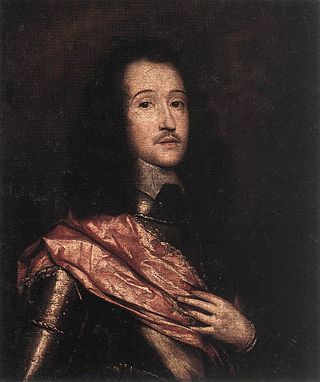
Richard Lovelace was an English poet in the seventeenth century. He was a cavalier poet who fought on behalf of Charles I during the English Civil War. His best known works are "To Althea, from Prison", and "To Lucasta, Going to the Warres".
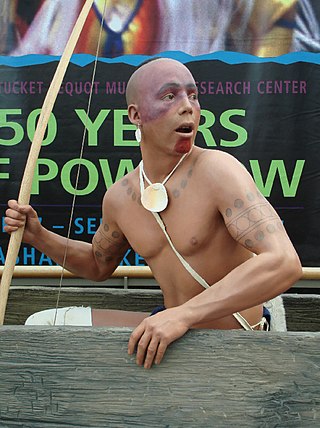
The Pequot are a Native American people of Connecticut. The modern Pequot are members of the federally recognized Mashantucket Pequot Tribe, four other state-recognized groups in Connecticut including the Eastern Pequot Tribal Nation, or the Brothertown Indians of Wisconsin. They historically spoke Pequot, a dialect of the Mohegan-Pequot language, which became extinct by the early 20th century. Some tribal members are undertaking revival efforts.
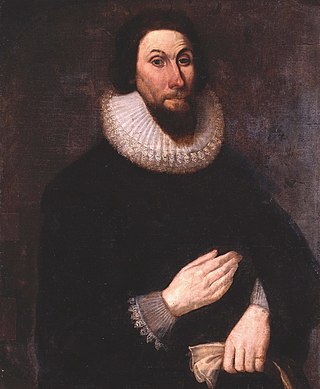
John Winthrop was an English Puritan lawyer and one of the leading figures in founding the Massachusetts Bay Colony, the second major settlement in New England following Plymouth Colony. Winthrop led the first large wave of colonists from England in 1630 and served as governor for 12 of the colony's first 20 years. His writings and vision of the colony as a Puritan "city upon a hill" dominated New England colonial development, influencing the governments and religions of neighboring colonies in addition to those of Massachusetts.
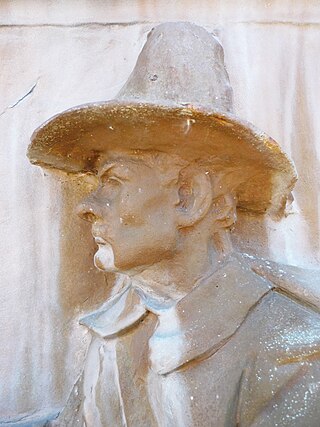
John Underhill was an early English settler and soldier in the Massachusetts Bay Colony, the Province of New Hampshire, where he also served as governor; the New Haven Colony, New Netherland, and later the Province of New York, settling on Long Island. Hired to train militia in New England, he is most noted for leading colonial militia in the Pequot War (1636–1637) and Kieft's War which the colonists mounted against two different groups of Native Americans. He also published an account of the Pequot War.

The Pequot War was an armed conflict that took place in 1636 and ended in 1638 in New England, between the Pequot tribe and an alliance of the colonists from the Massachusetts Bay, Plymouth, and Saybrook colonies and their allies from the Narragansett and Mohegan tribes. The war concluded with the decisive defeat of the Pequot. At the end, about 700 Pequots had been killed or taken into captivity. Hundreds of prisoners were sold into slavery to colonists in Bermuda or the West Indies; other survivors were dispersed as captives to the victorious tribes.
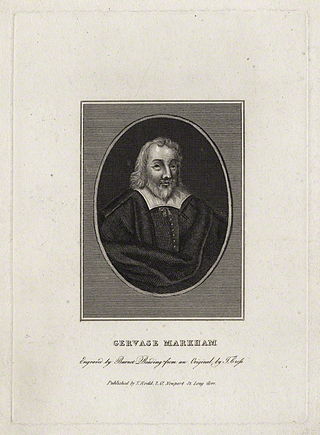
GervaseMarkham was an English poet and writer. He was best known for his work The English Huswife, Containing the Inward and Outward Virtues Which Ought to Be in a Complete Woman, first published in London in 1615.
The so-called Pett dynasty was a family of shipwrights who prospered in England between the 15th and 17th centuries. It was once said of the family that they were "so knit together that the Devil himself could not discover them". This saying refers to the era during which Samuel Pepys was much involved in getting royal aid for Ann Pett, widow of Christopher Pett. The Petts Wood district of south-east London is named for the family.
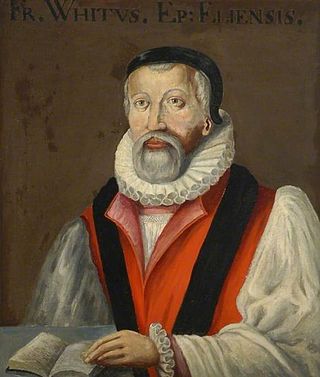
Francis White was an English bishop and controversialist.

Sir Thomas Herbert, 1st Baronet (1606–1682), was an English traveller, historian and a gentleman of the bedchamber of King Charles I while Charles was in the custody of Parliament.
Sir Henry Marten, also recorded as Sir Henry Martin, was an English judge and politician who sat in the House of Commons at various times between 1625 and 1640. He served as Judge of the High Court of Admiralty from 1617 to 1641.

Matthew Wren was an influential English clergyman, bishop and scholar.
Sir Philip Stapleton of Wighill and of Warter-on-the-Wolds, Yorkshire was an English Member of Parliament, a supporter of the Parliamentary cause during the English Civil War. His surname is also sometimes spelt Stapylton or Stapilton.
Robert Allot was a London bookseller and publisher of the early Caroline era; his shop was at the sign of the black bear in St. Paul's Churchyard. Though he was in business for a relatively short time – the decade from 1625 to 1635 – Allot had significant connections with the dramatic canons of the two greatest figures of English Renaissance theatre, William Shakespeare and Ben Jonson.
Francis Constable was a London bookseller and publisher of the Jacobean and Caroline eras, noted for publishing a number of stage plays of English Renaissance drama.

Henry Danvers, 1st Earl of Danby, KG was an English soldier. Outlawed after a killing, he regained favour and became a Knight of the Garter.
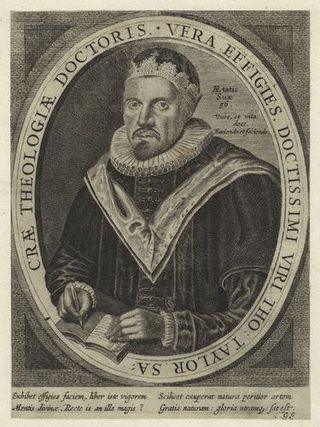
Thomas Taylor (1576–1632) was an English cleric. A Calvinist, he held strong anti-Catholic views, and his career in the church had a long hiatus. He also attacked separatists, and wrote copiously, with the help of sympathetic patrons. He created a group of like-minded followers.
Henry Hexham was an English military writer. He also worked on Mercator's Atlas and on a Copious English and Nether-duytch Dictionarie.
Sir Thomas Posthumus Hoby, also spelt Hobie, Hobbie and Hobby, Posthumous and Postumus, was an English gentleman and politician who sat in the House of Commons at various times between 1589 and 1629. A Puritan, he has been claimed as the inspiration for Shakespeare's character Malvolio in Twelfth Night.

Sarah Harington (1565–1629) was an English courtier.
William Eure, 4th Baron Eure was an English nobleman.











